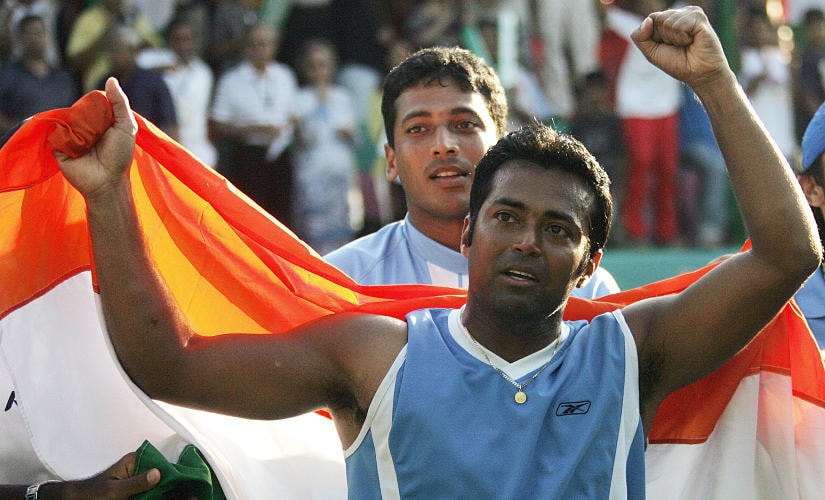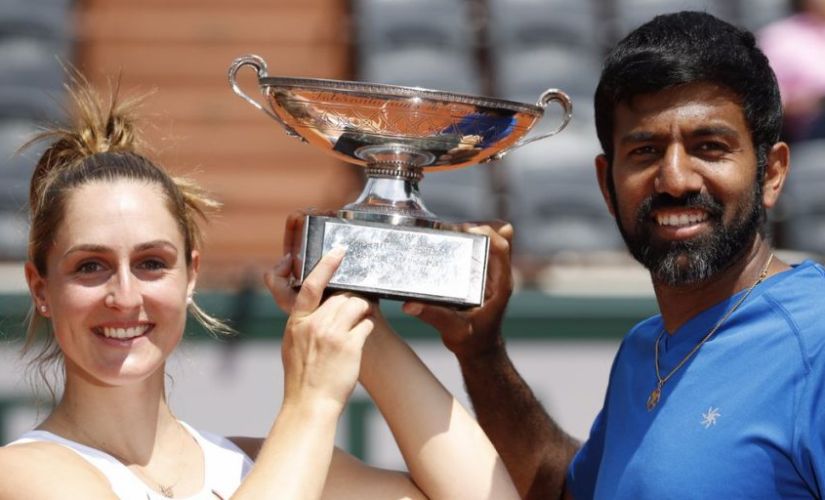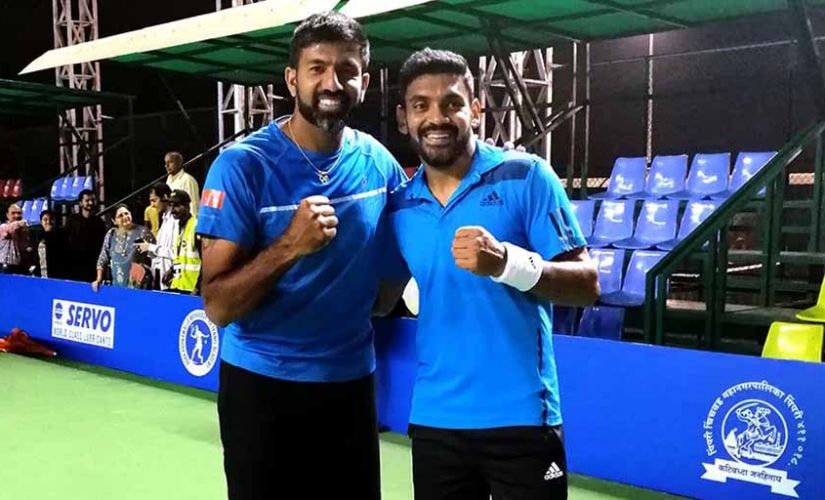An errant Prajnesh Gunneswaran sent a forehand wide, against Tatsuma Ito, to bring an end to his 2020 Australian Open campaign. The first round exit, after having got into the main draw as a lucky loser and pitted against the world No 146, was disappointing. But falling short in Grand Slams, in singles, is something Indian tennis is used to . After all, the last time an Indian man won a round in majors was Somdev Devvarman at the 2013 US Open. But, in recent times, even success on the doubles court has dried up. [caption id=“attachment_6044371” align=“alignnone” width=“825”]  Leander Paes with teammate Mahesh Bhupathi in 2006 Davis Cup match against Pakistan. AFP File Photo[/caption] At the 2020 Australian Open, three Indian men entered the doubles competitions. Rohan Bopanna, partnering Yasutaka Uchiyama, bumped into the Bryans, Mike and Bob, in the first round and went down in three sets. Divij Sharan, in the company of Artem Sitak, lost in the second round of men’s doubles. Leander Paes, partnering Jelena Ostapenko, went out in the second round of mixed doubles after getting a wild card entry. The best result came from Bopanna, who in the company of Nadiia Kichenok, made quarterfinals of the mixed doubles event. Perhaps, we have been spoilt by the success of Paes and Mahesh Bhupathi, who between them own 30 majors. Perhaps, we never gave them credit they deserved, dismissing their doubles success as superfluous in the bigger scheme of things. Starting with Bhupathi’s maiden triumph, the mixed doubles title at the 1998 French Open, he and his former doubles partner Paes had been consistent threats at majors, be it men’s or mixed doubles. Together, they were a riot. But even separately, they had enough skill and savvy to keep winning. Bhupathi won eight mixed and four men’s doubles majors, while Paes had ten mixed and eight men’s doubles titles. The latter won his last men’s doubles title at the 2013 US Open and mixed at the 2016 French Open. Meanwhile, the last time an Indian was on a Grand Slam roll of honour was Rohan Bopanna, who won his one, and so far only, major at the mixed doubles event at the 2017 French Open. It is now, that the glory days are well behind and the 46-year-old Paes is on his farewell lap, that we feel the need for introspection. “There is going to be a lull in doubles for the next few years,” says former India Davis Cup captain Anand Amritraj. “I don’t think any of the younger players are interested in playing doubles, more importantly none of them know how to volley, which is a big part in doubles.” [caption id=“attachment_7997581” align=“alignnone” width=“825”]  Rohan Bopanna and Gabriela Dabrowski with the 2017 French Open mixed doubles trophy. Image: Twitter/@WTA[/caption] Bopanna, the top-ranked Indian doubles player, will turn 40 this March and has more tennis years behind than ahead of him. Even the next generation of doubles players is well in their 30s: Divij Sharan is 33, Purav Raja is 34, Vishnu Vardhan is 32, Jeevan Nedunchezhiyan is 31 and N Sriram Balaji, the youngest, will turn 30 in March. These are the only ones who have at least broken into the top-100 at some point in their career, and even they are not mainstays in Grand Slams. But even more than the majors, it is in Davis Cups where the lack of a solid doubles pair is felt. There was a time when Paes-Bhupathi went unbeaten in the team competition from 1997 to 2010, creating a record for the longest winning streak: 24 and still unbeaten. Wherever the tie, whoever the opposition, there was some respite that India would at least come back with one point. That is not a certainty anymore either. Since 2011, with Paes-Bhupathi ceasing to appear as a team in Davis Cup, India has tried out 13 different doubles combinations and have a win-loss record of 12-8. The emphasis recently has been on winning the singles rubbers, and rightly so, but the assurance of one point, especially in close matches on paper, never hurt anyone. “I think the comparisons (with Paes, Bhupathi) are inevitable,” says Raja, who teamed up with Paes briefly in 2017. “But doubles is a completely different sport now. As we saw at the Australian Open, anyone can win a doubles title now, the field is wide open. It is like comparing Ramanathan Krishnan and Somdev Devvarman; while Krishnan had to compete with 200 players, Somdev had to compete with 2000.” There is some merit to this argument. While the era which Paes-Bhupathi ruled, doubles was mainly a ‘team sport’, it has become a sum of individuals now. In 2006, ATP overhauled doubles, to attract a larger audience. They introduced the no-ad (whoever wins the point at 40-40 wins the game) rule and brought in the 10-point match tie-break instead of the deciding set. More importantly, they made it easier for singles players to enter field by allowing them to use their singles ranking to enter tournaments. [caption id=“attachment_7997591” align=“alignnone” width=“825”]  Rohan Bopanna and Divij Sharan are slated to carry India’s hopes in doubles in Tokyo Olympics. File image: Twitter @MaharashtraOpen[/caption] With their better, and more consistent serves and better returns, singles players bring a whole new skill-set and dynamic to the court. “The one way to counter them is to have a solid team,” says Amritraj, who has 12 doubles titles to his name. “You have to stick to a partner for at least a year, build a chemistry and understanding, to give yourself a chance. But unfortunately, no one wants to do that now.” Don’t let tennis players tell you rankings are only a number. In the end, they determine whether a player gets into a tournament or not, and the higher their partner’s ranking the better their chance of being seeded, or seeded higher and getting a better draw. The individual rankings, also introduced in 2006, have been one of the tipping points why players don’t want to continue with a partner too long if the results are anything under-par. “It is difficult for us to get into tour events,” says Raja, ranked 91 in the world in doubles. “We need the ranking points. So right now, given that we have absolutely no structure in India and very little help, just the fact that some of us are qualifying for Grand Slams is a good thing.” The ambitions have lowered significantly. But it only underlines the fact that Paes and Bhupathi were extraordinary athletes who thrived despite a broken system.
The last time an Indian was on a Grand Slam roll of honour was Rohan Bopanna, who won his one, and so far only, major at the mixed doubles event at the 2017 French Open
Advertisement
End of Article


)

)
)
)
)
)
)
)
)



